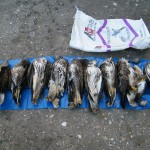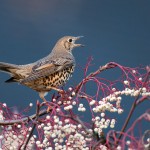
Yesterday, the Wildlife Trusts awarded Simon Barnes (pictured right) their Rothschild Medal. this is a richly deserved honour in recognition of Simon’s campaigning journalism and beautiful writing – it probably deserves a mention in The Times. This year Simon has been closely associated with two issues that will be familiar to regular readers of this blog: the successful battle to save the Sanctuary LNR and what will be the ultimately successful battle to end persecution of Hen Harriers. Congratulations! Simon, and Well Done! Wildlife Trusts.
When I was reading about the Protection of Birds Act (1954) I came across one MP who spoke about one species of predatory bird, one that occasionally takes gamebirds apparently, thus: ‘I rather regret the complete protection of **** ‘ and ‘…where the **** is doing damage on sporting estates, it will I’m afraid, be shot, irrespective of the provisions of this bill’ and ‘It is the bird which I dislike the most’. Any idea what voracious predator he meant? Answer at foot of this post.
 I’ve dropped my binoculars again – this is a bad habit – but In Focus tell me that they can be repaired – big relief!
I’ve dropped my binoculars again – this is a bad habit – but In Focus tell me that they can be repaired – big relief!
![By Tommy Hansen.B.A.C. at da.wikipedia [Public domain], from Wikimedia Commons](https://markavery.info/wp-content/uploads/2014/11/Sort_sol_pdfnet-150x150.jpg)

Some of the summing up of District Judge Peter Veits in the Lambert case: ‘It is clear to me that such deliberate poisoning of birds of prey deserves custody, the issue therefore is whether that should be immediate or suspended.
Mr Lambert is 65 and has not troubled the courts before. He has worked all his life in farming and then game keeping, but never received any formal training for this role. As a result of the prosecution, he has lost his employment, although his employers allowed him to take early retirement, and as a consequence lost his home and his good name. Mr Lambert, no doubt like many in his position, appears to have largely been left to his own devices is his day to day duties. There is some disagreement as to the level of supervision given by his employers but even if he was subject to some form of annual appraisal that was clearly not enough.
Those who employ gamekeepers have a strict duty to know what is being done in their name and on their property. They also have a duty to ensure that their gamekeepers are properly trained and capable of keeping abreast of the complex laws relating to the use of poisons. In other industries employers as well as the employee could be facing prosecution in such cases and I hope therefore that this case can serve as a wake up call to all who run estates as to their duties.It is clear that the buzzard population in Norfolk is increasing and this is something that is to be applauded and not something that is seen as an inconvenience to those who chose to run shoots. Nature must be able to live side by side with such activities. I do not believe immediate custody in Mr Lambert’s case is warranted and am therefore prepared to suspend my sentence to reflect the ongoing implications for him and his family.‘
That seems a pretty clear call for vicarious liability.
![Jan Weenix (1639/1643–1719) [Public domain], via Wikimedia Commons](https://markavery.info/wp-content/uploads/2012/09/477px-Jan_Weenix_-_Dead_Hare_and_Partridges_-_WGA255081-150x150.jpg)
And, sticking with GWCT, you could almost believe that the GWCT were appalled by the case of the Norfolk gamekeeper Allen Lambert – but they somehow fail to say so themselves in a blog of their own writing. They quote others, in the way a journalist might, but they fail to lay out their own thoughts. An opportunity missed.
I’m talking at a BTO regional conference in Nottinghamshire on Sunday.
I spoke at the RSPB Oxford Group yesterday – and a very nice bunch they were too. And excellent questions, and a rich source of further signatures for our e-petition to ban driven grouse shooting.
I saw my first Fieldfares of the year at Otmoor yesterday too – they made me smile.
 Here is a link to the WWT’s Dr Debbie Pain speaking about lead poisoning at the Convention on Migratory Species in Quito – worth a listen (it’s just 3 minutes long). Let’s hope the UK takes a helpful line – and I shall be asking them about this at the end of the conference.
Here is a link to the WWT’s Dr Debbie Pain speaking about lead poisoning at the Convention on Migratory Species in Quito – worth a listen (it’s just 3 minutes long). Let’s hope the UK takes a helpful line – and I shall be asking them about this at the end of the conference.
 The Defra Hen Harrier sub-group met this week and, I gather from a variety of sources, that nothing was agreed – not even a date for their next meeting – not even whether there would be a next meeting. Sounds to me as though the long grass is about to be cut.
The Defra Hen Harrier sub-group met this week and, I gather from a variety of sources, that nothing was agreed – not even a date for their next meeting – not even whether there would be a next meeting. Sounds to me as though the long grass is about to be cut.
![By Trebol-a (Own work) [CC-BY-SA-3.0 (http://creativecommons.org/licenses/by-sa/3.0)], via Wikimedia Commons](https://markavery.info/wp-content/uploads/2013/04/800px-Athene_noctua_portrait-150x150.jpg)

“Those who employ gamekeepers have a strict duty to know what is being done in their name and on their property.”
Could anyone explain what this ‘strict duty’ is? As far as I’m aware this is nonsense. There seems to be no legal implications for a gamekeepers employer knowing or not knowing what their underlings are doing.
Hence the need for the vicarious liability legislation to be implemented in England.
Once hen harriers are reintroduced to lowland areas (and the computer generated number of 300 pairs of hen harriers for England indicates that they will be reintroduced to lowland areas in due course), they will be vulnerable to household cats, as are other protected lowland birds.
A law of vicarious liability will make those cat owners responsible for cats illegally killing protected birds liable to jail sentences of up to six years.
Hen harrier nests will be monitored by CCTV. Evidence will be readily available to secure a conviction.
For example, had the eagle owl that attacked a hen harrier in Bowland a couple of years back been privately owned, a law of vicarious liability would have convicted and no doubt jailed the owner of that owl:
http://www.birdwatch.co.uk/channel/newsitem.asp?c=11&cate=__9095
19% of British households own cats. There are 8.5 million cats in this country.
Good luck with getting that one through parliament.
“A law of vicarious liability will make those cat owners responsible for cats illegally killing protected birds liable to jail sentences of up to six years”
No it won’t. Just as it doesn’t in Scotland.
Martin WW – of course it won’t and doesn’t.
There is no difference between poison killing a rare bird and a cat killing a rare bird.
Whoever administered the poison is guilty of a crime. Whoever owns the cat is guilty of a crime.
Vicarious liability law will ensure that the owner of the cat is swiftly identified in order to avoid penalties for the landowner and/or his staff.
The net result will be destruction of the cat and up to 6 years in jail for the cat owner.
That will look good in the manifesto.
Monro – miaowww! Were you at the GWCT evening?
Regarding the GWCT, the blog effectively describes the Norfolk illegal killing as a horror story, which it was. It also expresses the hope that cases of that nature soon become history, a hope that we all share.
The quote from the National Gamekeepers Organisation could not have been more condemnatory.
But, in contrast to many blogs, the GWCT is balanced and provides some useful perspective on the year on year decline in wildlife crime in Britain.
This is confirmed by the recent rspb birdcrime report:
Overall ‘birdcrime’ is down dramatically from last year (25%) and by over 50% since 2009, despite the significant increase in numbers of birds of prey since then.
As we can tell from rspb figures, out of the 27 individuals prosecuted for birdcrime in 2013, only four were associated with gameshooting, one of whom was found not guilty.
All the other individuals were involved with falconry, racing pigeons, trade in wild birds or eggs, or poaching.
http://www.rspb.org.uk/Images/birdcrime_2013_tcm9-384665.pdf
And, yes, well done Mike Clarke in recommending more moderation, less crudeness, in debates between all agencies with an interest in wildlife conservation.
He, rightly, got a good round of applause.
Monro – were you at the GWCT meeting? Tell us more…
The GWCT blog is not balanced but I agree that the analysis of the bird crime figures is interesting and appears somewhat encouraging. That’s why I linked to it. Of course it is an analysis of the RSPB figures isn’t it? So the RSPB report hardly’ confirms’ the GWCT analysis – it is the source for the analysis. Isn’t that right?